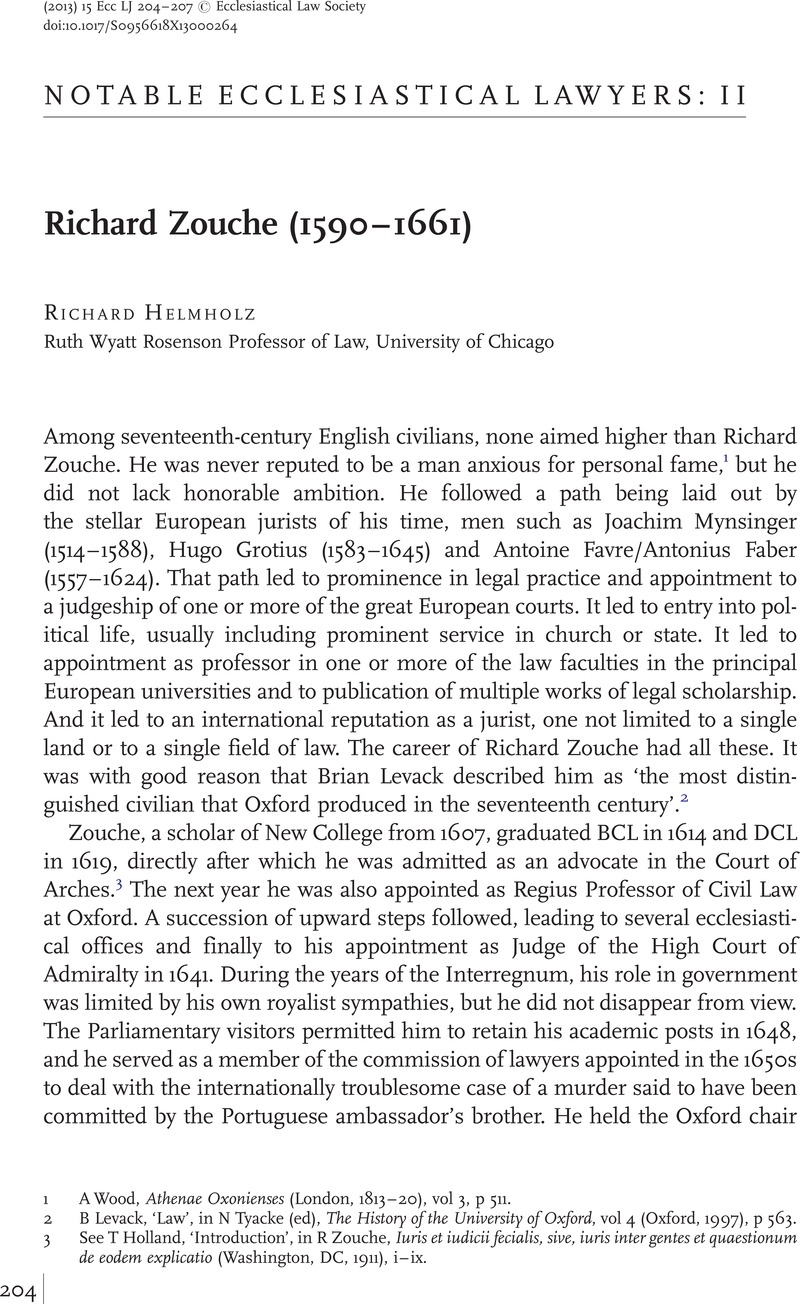No CrossRef data available.
Published online by Cambridge University Press: 10 April 2013

1 Wood, A, Athenae Oxonienses (London, 1813–20), vol 3, p 511Google Scholar.
2 Levack, B, ‘Law’, in Tyacke, N (ed), The History of the University of Oxford, vol 4 (Oxford, 1997), p 563Google Scholar.
3 See Holland, T, ‘Introduction’, in Zouche, R, Iuris et iudicii fecialis, sive, iuris inter gentes et quaestionum de eodem explicatio (Washington, DC, 1911), i–ixGoogle Scholar.
4 Eg Lipenius, M (1630–1692), Bibliotheca realis iuridica (Leipzig, 1757), vol 1, pp 723–754Google Scholar.
5 ‘Iuventuti Magnae Britanniae iuris studiosae’, See R Zouche, Elementa jurisprudentiae (first edition, 1629), preface.
6 Eg Zouche, R, Cases and Questions Resolved in the Civil Law (Oxford, 1652; in English)Google Scholar.
7 Latin editions were published in Leiden in 1651, The Hague in 1659 and Mainz in 1661. The German edition, translated by Alfred Vogel, was published as Algemeines Völkerrecht, wie auch algemeines Urtheil und Ansprüche aller Völker (Frankfurt, 1666)Google Scholar.
8 Zouche, R, Solutio quaestionis veteris et novae, sive de legati delinquentis judice competente dissertatio (first edition, 1657)Google Scholar.
9 Lipenius, Bibliotheca, 646–663, lists works from Florence, Genoa, Luca, Mantua, Milan, Pavia, Naples, Parma, Bologna, Rome, Ferrara, Perugia, Sicily, Venice and Verona. In some cases, these included only statutes and decisiones drawn from the local courts.
10 Zouche, R, Descriptio iuris et iudicii ecclesiastici secundum canones et constitutiones Anglicanas (Oxford, 1636), pt IV, § 8Google Scholar.
11 Ibid, pt I, § 8: ‘Et semper prospicere ut ecclesia sit libera et omnia iura et privilegia integra et inviolate retineat’.
12 Ibid, pt II, § 4.
13 Cosin, R, Apologie for sundrie proceedings by iurisdiciton ecclesiasticall (London, 1591)Google Scholar; Ridley, T, View of the civile and ecclesiastical law (London, 1607)Google Scholar.
14 See Levack, B, The Civil Lawyers in England 1603–1641 (Oxford, 1973), pp 128, 138, 149Google Scholar.
15 Of this nature was Zouche, R, The Jurisdiction of the Admiralty of England Asserted against Edward Coke's Articuli Admiralitatis (London, 1663)Google Scholar. Note, however, that it was published after his death.
16 Eg Coquillette, D, The Civilian Writers of Doctors' Commons, London (Berlin, 1988)Google Scholar. John Cowell (1554–1611) is probably the best example of a civilian whose fame rests on contemporary controversy: see eg Kenyon, J, The Stuart Constitution (Cambridge, 1969), p 8Google Scholar.